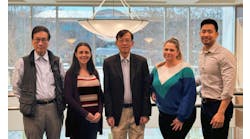Marking International Long COVID Awareness Day on March 15, the federal Agency for Healthcare Research and Quality (AHRQ) gave an update on the AHRQ Long COVID Care Network, which was launched in September 2023.
Long COVID can include more than 200 symptoms, including severe cardiovascular and cognitive impairment, that develop or continue for weeks, months, or even years after initial infection. The impacts can be profound and debilitating, particularly for underserved or minority populations with poor access to affordable, quality healthcare or jobs that allow accommodations for illness and disability. According to the CDC, in 2022, at least 9 million people throughout the country were struggling with post-COVID-19 infection effects, and over 18 million people have experienced Long COVID.
The AHRQ Long COVID Care Network consists of nine multidisciplinary Long COVID clinics to which AHRQ awarded $45 million in grants to expand access to comprehensive care, develop and implement new or improved care delivery models, foster best practices for Long COVID management, and support the primary care community nationwide with Long COVID education and management.
The network design was informed partly by a January 2023 summit with Sen. Tim Kaine and Virginia healthcare delivery organizations, clinicians, and patients. AHRQ has also collected input from representatives from critical constituencies such as health system and practice leaders, payers and policymakers, subject matter experts, and patients who have lived with Long COVID and shared their experiences. Additional contributions came from previous AHRQ research on caring for people with multiple chronic conditions.
The University of Washington Medicine Post-COVID team was awarded one of nine grants from the Agency from Healthcare Research and Quality (AHRQ) to improve access to care for underserved people with long COVID.
"This project is the culmination of several years of development of a multidisciplinary team to care for people with long COVID and a testament to the power of working together across specialties to harness collective expertise to tackle a challenging problem," said Janna Friedly, M.D., M.P.H., principal investigator on the grant and executive director of UW Medicine's Post-COVID Rehabilitation and Recovery Clinic, in a statement.
The AHRQ-funded Long COVID clinics are focusing on increasing access to care, improving person-centered care coordination, expanding multidisciplinary networks and behavioral health support, and expanding social support services for adult, pediatric, and priority populations through strategies such as:
• Increasing Long COVID care access by expanding in-person and virtual visit capacity, establishing new satellite clinics, and growing provider-based referrals through a coordinated education series.
• Adding dedicated care coordination, social services, language interpretive staff, and group programs for people with Long COVID.
• Integrating dedicated behavioral health staff and implementing behavioral health and rehabilitation group support programs.
The AHRQ funding is supporting expansion of the services provided at the Atlanta-based Emory University Hospital Midtown Long COVID Clinic and the reopening and expansion of the Grady Memorial Hospital Long COVID Clinic. The Emory Long COVID Clinic opened in September 2020 and currently serves approximately 400 patients.
The funding is helping to provide:
• future extended hours
• telemedicine services
• expansion of the clinics’ subspecialty network with expertise in long COVID
• expansion of the behavioral health and rehabilitation services, and
• increased care coordination and social services.
“We are very excited for this opportunity to provide the coordinated care that COVID long-haulers deserve. We understand that long COVID care can be fractured, and many patients have not received validation of their symptoms,” said Tiffany Walker, M.D., assistant professor of medicine in the Division of General Internal Medicine at Emory and Grady and principal investigator of the AHRQ grant, in a statement.
The AHRQ Long COVID Care Network clinics are engaging in a peer-to-peer learning community and working to implement the latest evidence. As they develop new insights and tools to improve care, the AHRQ Long COVID Care Network will share what they learn with primary care physicians, health system leaders, and other vital stakeholders nationwide, not just those served directly by the network clinics.
The U.S. Department of Health and Human Services also has created an Office of Long COVID Research and Practice to lead the Long COVID response and coordination across the federal government as well as the National Institutes of Health (NIH) launch of the Long COVID clinical trials through the RECOVER Initiative.


